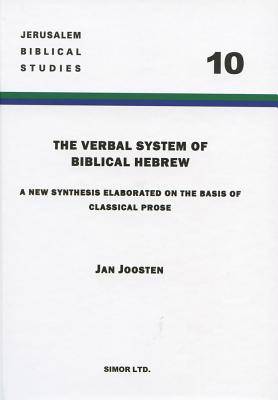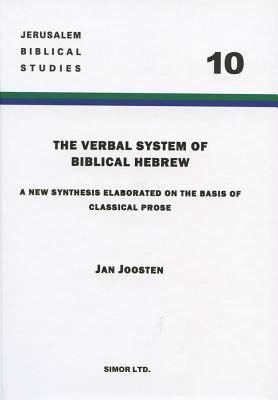
- Retrait gratuit dans votre magasin Club
- 7.000.000 titres dans notre catalogue
- Payer en toute sécurité
- Toujours un magasin près de chez vous
- Retrait gratuit dans votre magasin Club
- 7.000.0000 titres dans notre catalogue
- Payer en toute sécurité
- Toujours un magasin près de chez vous
The Verbal System of Biblical Hebrew
A New Synthesis Elaborated on the Basis of Classical Prose
Jan Joosten
67,95 €
+ 135 points
Description
The verbal system of Biblical Hebrew has been a daunting challenge for Hebraists, Bible scholars, and comparative Semitists. Already in ancient versions we see translators struggling with it. Good understanding of the verbal system is of vital importance not only for grammarians, but also for exegetes. In the past one and half a century or so some significant advances have been made, thanks to the discovery of new texts in Hebrew and cognate Semitic languages and developments in general linguistics, even the discovery of totally new languages such as Ugaritic and Eblaite. Not a few scholars have made use of these new data and applied new linguistic perspectives in order to elucidate the Hebrew verbal system as a whole and various aspects of the system. Joosten is one such. With his profound expertise in Biblical Hebrew, the Jewish Bible, Classical Syriac and the Septuagint he presents here an impressive synthesis of the modern studies of the Hebrew verbal system. It goes far beyond a mere critical survey of the past and present studies, but Joosten has conducted his own research on the subject over the past two decades or so. This book is focused on the classical prose of Genesis up to Kings, though more than cursory attention has been paid to later texts and poetic texts. The analysis and presentation of data is commendably lucid, backed up with plentiful examples. The author's use of technical terms, some not part of the common parlance of Bible scholars, is user-friendly and not off-putting. Joosten is modestly aware himself that he has not said the last word, but has broadened our horizon. We have here an essential reading not only for Hebraists and Semitists, but also for anyone seriously interested in the Jewish Bible.
Spécifications
Parties prenantes
- Auteur(s) :
- Editeur:
Contenu
- Nombre de pages :
- 513
- Langue:
- Anglais
- Collection :
Caractéristiques
- EAN:
- 9789652420114
- Date de parution :
- 10-08-12
- Format:
- Livre relié
- Format numérique:
- Genaaid
- Dimensions :
- 168 mm x 241 mm
- Poids :
- 498 g

Les avis
Nous publions uniquement les avis qui respectent les conditions requises. Consultez nos conditions pour les avis.






